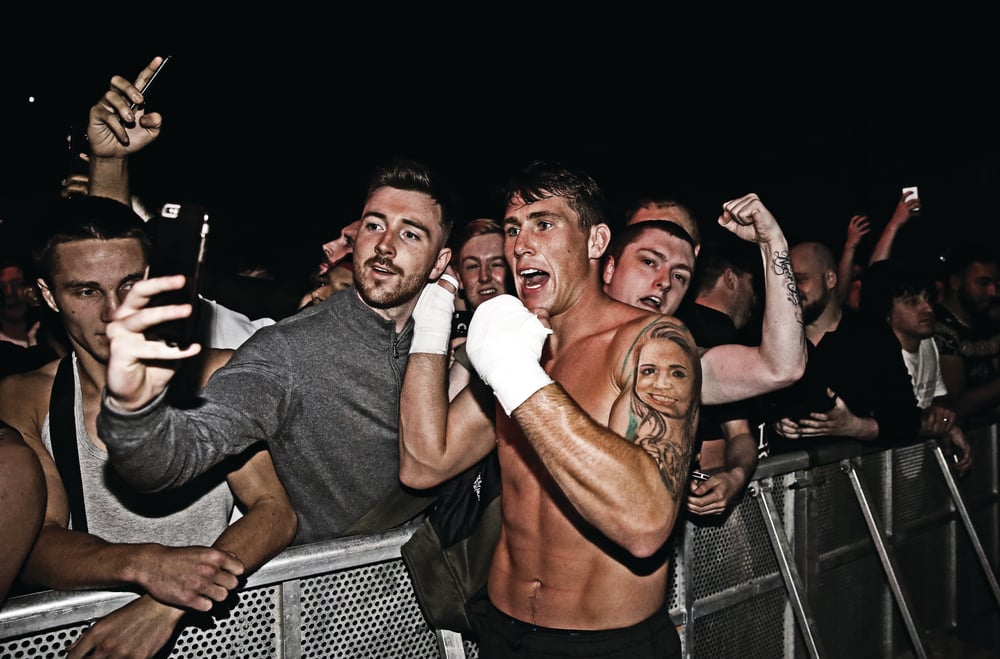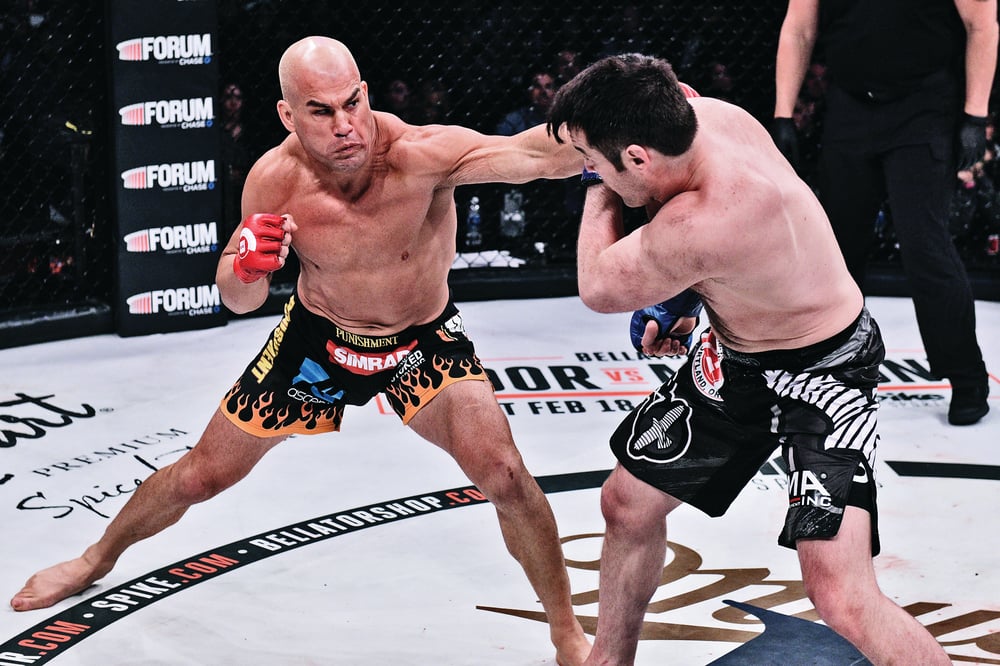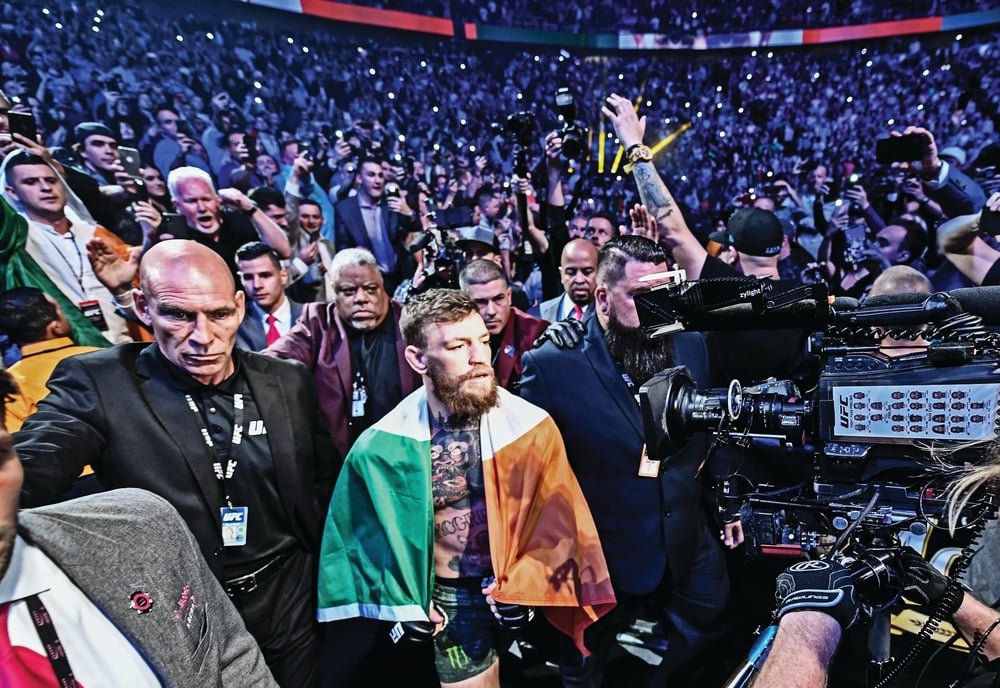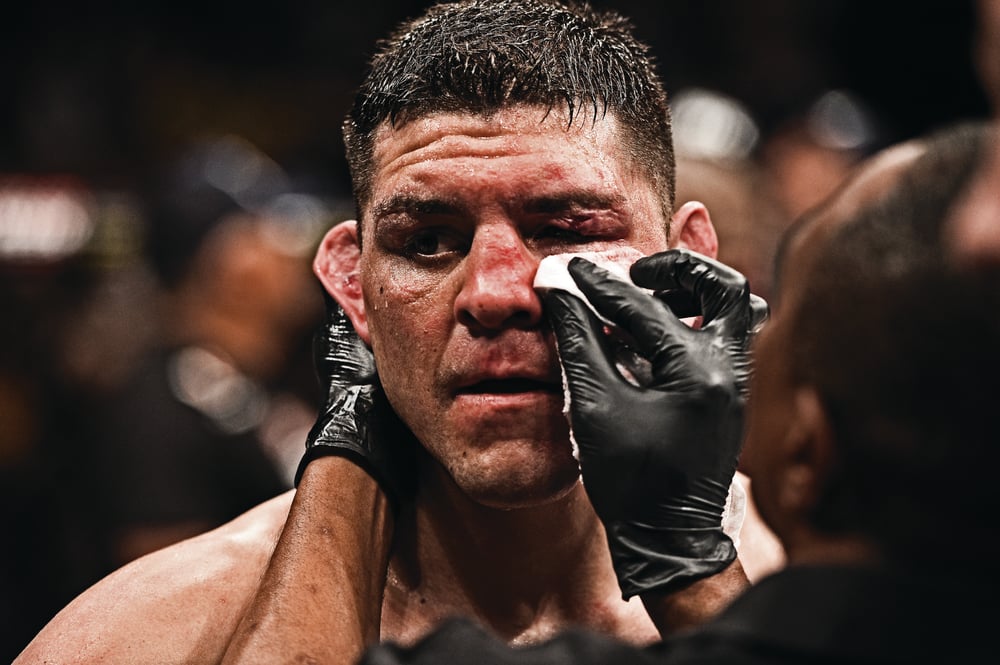
Issue 188
February 2020
Why are MMA fans drawn towards ‘authentic’ fighters, turning them into the real stars of the sport? Fighters Only investigates
There is something quite special about mixed martial arts fans. The unique band of brothers and sisters have so often proved to be a barometer for the health of the sport. Eerily so. A tribe in tune. So often, that comes down to one thing: authenticity of the fighter. Nowhere more so than in voting with their views for the fighters who are elevated to special status.
No one is made a star in this sport, regardless of their longevity as a champion, the belts they might carry, or the bulging bank vaults of money they might have stacked up or invested in homes and businesses.
No. A star is born when the people decide. Power of the people, power of the fans. A collective voice of support or admiration can mean so much more than being a belt-holding champion. Being ‘the people’s champion’ – or even, as we have seen lately, becoming the ‘Baddest Mother Fucker’ champion – can mean so, so much more. On many levels, but importantly on the purest of levels, which is what really underpins the roots of the sport. It is almost a ‘knowing’.
There are so many gray areas here, because of the masks fighters wear, but authenticity is at its heart. No mask means a more powerful message, very often. It reveals the real person there, peering out, facing the reality of being a fighter in one of the most unusual, challenging roles you could ever pick in life. And which few people really can choose.
Look back over the short, yet fascinatingly tapestried, history of MMA, the most popular, most loved fighters are always the most authentic. Closest to their essence. Whether it be in brawling style, quiet assassin mode, fighting artist, trash-talker or rebel, if they are true to themselves, the fans become true to them.
It almost always plays out – in the end. Think of names right there such as Eddie Alvarez, Donald Cerrone, Justin Gaethje, the Diaz brothers, Darren Till, Jorge Masvidal. Cut them open, and they bleed of themselves. Through and through. There are many, many others, of course.
We will never get away from this: the sport is predicated on a level of authenticity rarely seen in other walks of life. There is so much bullshit everywhere. And MMA just gets rid of that on so many levels (it can add to it, too). But that’s why when those masks are off, we learn to love, learn to become endeared to, crave another fight or event from them, and grow to understand them, and why they fight.

Similarly, one of the sport’s greatest practitioners in Randy Couture, as authentic as you will find across the last 36 years of the sport since UFC 1, sees the struggle between two fighters as ‘kinetic chess’. Within these parameters, an ‘authenticity’ moves the fans, especially when we become more studied and realize the fear, nerves and control it takes to step in there. For fighters to be themselves, be authentic, it breaks ground – breaks bread even – between the human being doing battle, and the fans. It is why we feel that bond. Couture always had a frightening calmness about him, a cerebral way of explaining or breaking down how he fought. He is the kind of character who you know if he told you that you were leaving the trench at 5am to walk through enemy lines, you would go with him. Utterly believable, frighteningly real.
In recent times, it has been much to the fore, this authentic theme, even to the point of it being marketed into an actual event.
We have seen how it is the people who decide on those who will be elevated. We all know, for example, Jon Jones is the greatest, pound for pound, in the sport. But the fans have decided there is a dichotomy around Jones. Drug testers and spillages in his private life have made him a villain. But in the wrong ways.
Yet look at Jorge Masvidal. He was heading towards journeyman status, but his back story, the street fighting scene in Miami, his raw response to Leon Edwards in London early last year, led to the point where, when he eventually channelled his inner gangster by dressing as Scarface character Tony Montana for his press conference with Nate Diaz, it worked to perfection. And – after all – he holds the BMF belt now – and if Conor McGregor is cleanly through his comeback fight, the big one is on. It came about late in his career. But his authenticity, finally given a major platform, crept up on the masses.
Notoriety against Leon Edwards, a running apache flying knee knockout on the biggest card of 2019 against Ben Askren, followed by theatrics that went viral, the win against Diaz, and now he is a star. How? By being himself, in the right place, at the right time.

Equally, look at the British MMA fighter Darren Till after his contest with Kelvin Gastelum, recently. You could see the fear as he walked into the Octagon. It was unusual for him, and markedly different to other nights on his lonely walk. “To be totally honest, I was terrified to get in there, just to do three rounds,” he admitted after winning, arguably the biggest fight of his career. “After the first round, I was just like “What’s wrong with you, Darren?” I knew I was one of the best. ‘There’s all this BMF talk going on and I just stepped up in weight and fought Kelvin Gastelum, the bulldozer of the middleweight division, so I’m just taking this a step at a time and I’m just happy to even be here...Any man over 70 kilos, I should be able to beat them. Weight class doesn’t matter to me. ‘You could come to me tomorrow and tell me I’m fighting the heavyweight champ and I’ll do it. ‘I know I’ll go in there and probably get put in a coma, but I’ll fight him, because I’m a man and a true fighter. I’m a BMF.” Spoken like true Till. Yet it was Till admitting his fear that made the fans love him deepest. His vulnerability was compulsive.
Across the entire sport over the last 20 years, the standout characters who have been able to grow on their authenticity, sometimes need time to be understood, but have gone on to become the sport’s biggest stars, or better put, most loved fighters. That realism is brought by so many – Dana White, for example. He has never changed. Or Fedor Emilianenko, Charles ‘Mask’ Lewis, the Diaz Brothers, Masvidal and Till, as mentioned, through Michael Bisping, who went from villain to cult hero to Hall of Famer over several years, Chuck Liddell, Royce Gracie, Tito Ortiz, Diego Sanchez. They all had a special authenticity about them, as if the masks were off, as if it were the real them we were seeing. Unmasked. Raw.

There are those who play, or act, at the opposite end of the scale. Like Colby Covington or, one of the very best at using masks, Chael Sonnen. In fact, Sonnen’s masks convinced other fighters, at times, that it was genuinely him. It crossed over into the psyche of Wanderlei Silva when Sonnen laid into Brazil, and its people, as he prepared to challenge Anderson Silva twice. It also crossed over when Sonnen fought Tito Ortiz in Bellator. Sonnen deeply riled his compatriot. Ortiz laid into Sonnen, who, let’s be honest, talked himself brilliantly into fights with Anderson Silva, Jon Jones, and others. But the fans knew it was not really him.
“He talks well. His mouth has got him every big fight he’s had,” said Ortiz in the build-up to their battle at The Forum. “And every time it’s time to present and perform, he’s failed. On Saturday night that won’t change. What I do well is come with heart and determination. I come with hard work and perseverance. When I get my hand raised, I’ll know why and so will the millions of fans who have had my back in the last 20 years.”
Ortiz went further. “The lion is the king of the jungle, with this big giant mane. And he’s in this hot smothering weather in Africa. And little small lions come up and poke at him and bite on his ear and his neck. The lioness comes over and bugs him. Then you’ve got the jackals and the rest of the wilderness looking and seeing this lion on this mountain top. They laugh at him. The hyenas laugh at him, nip at his toes, eat all his food. He sits back. Until one day he gets sick of it and he attacks and he shows people who the fucking king of the jungle is. What Sonnen has said and done has fuelled me.” They were on a dais together.
Sonnen began to mock snore. “You hear that snoring noise? That’s the noise you’ll hear on Saturday night. You’re a good comedian, man, a good actor. That’s about it. I’m a fighter. You’re an actor. You’re on The Apprentice (the TV show) because of me. You’re the bad guy because of me. You try to talk because of me. You’ve never won a world title. Who was the last champion you ever beat? Who was the last legend you ever beat? You call yourself a legend? What have you done legendary besides talk? Buddy, on Saturday night, those little blue eyes will be sparkling even more, man. Just wait and watch. You dug your grave, man.”
Real Ortiz that day, and the fans loved it, even though the Huntingdon Beach Bad Boy was long and late into his career. And, significantly, Ortiz went on to beat Sonnen a couple of days later in Los Angeles.
Yet there are some who are hiding behind masks, like Colby Covington, who admitted last December that his heralding of Donald Trump, some of his outrage-making was an act, a process of marketing himself. But not really himself. At an open forum, it was commented on by featherweight champion, Max Holloway.
“If you’re going to put up an act, I think you’ve got to stay with the act.” Two-division champion Amanda Nunes insists that she could never ‘create a persona’ because her family and friends would quickly bring her straight back down to earth. “They have me on a leash, for sure, because this lifestyle is crazy,” she explains.

John Kavanagh told me in March, 2016, long before ‘The Notorious’ Conor McGregor and Floyd Mayweather was a real thing that a fight with boxing’s PPV king “would be incredible.”
“From us it’s a yes. Maybe kickboxing would be a nice middle ground. Whether it’s boxing, kickboxing or MMA, it’s a yes from us It would be insane. What an honor it would be. A record-breaking event. The best MMA fighter vs the best boxer. Let’s do it.”
They did, of course, and in that brief period, McGregor’s character resonated with such wildness, and brutal honesty, like a Shakespearean fool, that we could identify with him and his every utterance, though sometimes crass, was comedy and entertainment. And, at the time, the great Irish fighter talked the talk and walked the walk when he stepped into the Octagon.
Once the fighting success faded – against Khabib Nurmagomedov, another who is admired for being utterly authentic as a fighter and devout Muslim with an ascetic lifestyle, in particular – McGregor’s antics have seen him fall from popularity. Was that, too, because his public face, his fighting character, a long way from the real man? We don’t know, but our fans’ barometer, again, probably tells us.
Scott Coker, president of Bellator, another deeply authentic character with long, long roots in the sport, going back to being an actor in martial arts movies and director in K1, spanning over three decades, told me that the great Fedor Emelianenko has never changed. Coker, deeply respected by fighters, signed the great Russian heavyweight to Bellator two years ago.
“I’m sure every league was going after him and I’m glad we got him. What makes me feel good about it is he put trust in our relationship. When we jumped back on the phone together is when we finished the deal. I think he trusts me. I trust him. It’s the basis of a great relationship.” And also an MMA legend whose consistency as a figure never deviates.

Being real can be shocking, too. Nick Diaz’s disarming openness about his dislike for prize-fighting can catch you off-guard. “I’m not fanatical about being a prizefighter anymore,” he told me in an interview a couple of years back.
Diaz, in spite of four years away from fighting, remains one of the most popular fighters in MMA history, repping the rebels and counter-culture. Diaz represents the ‘new cool’ of MMA, in an old school way, does things on his own terms, just like brother Nate, who refused to be hauled over the coals when an adverse finding came up in a test before he fought Masvidal for that ‘BMF’ title belt.
“I was (fanatical about this) when I was 16 years old,” the elder of the Diaz brothers told me. “But it’s my work now. I don’t think anyone really loves this job. Maybe they like it better than other jobs, but they’re not really in love with it. I’m glad I’m doing what I’m doing, but I don’t love being a prizefighter. At the start it felt like a suicide mission that was calling me and I knew I was heading down that road.”
He explained, going further: “People don’t take into consideration the little things that go on. This all comes with the territory and you have to deal with that stuff, but people don’t take those things into consideration. I know who I am now. Realistically, this is what I do and if there was any quit in me I’d never have made it this far in the first place. Just think of it simply...how about you trade spots with me on fight night?”
It’s a great point. Just put yourself in the fighter’s shoes.
In the long run, it means so much to fighters, especially later on in their careers when they reflect back on the lucky scrapes that they might have had, on the nights that things went their way, the nights of glory, in fights that come down, very often, to chance and timing, as much as to the skill and dedication that has been applied in the gym, in the camp, on the road, or cutting weight.

Dana White, the UFC president, has never changed. Not in the time I have known him, 14 years. He feels he is in the perfect job, and can simply be himself. He feels born to it. So much so he could not contemplate ever doing anything else.
“Back in my younger years I had some pretty crazy jobs. I was a bellman at a hotel. I paved roads when I was 17. Those are the jobs that show you what real work is. I know it’s goofy to say, but it really does help you build character. It also shows you what you don’t want to do for the rest of your life.”
“People are sitting in traffic and going to jobs they absolutely hate,” he continued. “But they’re doing it to put food on the table. If my kids, when they’re nineteen, came and told me that they wanted to pump gas for a living, I’d let them. If they said, “Dad, I love being around cars, I love getting up early in the morning, I love being in the garage.” If they were that passionate about it, I guarantee they’d end up owning five or six gas stations in a few years. Whatever it is you do, just make sure you’re passionate about it.”
“A fan on Twitter the other day said, ‘Look at Dana White’s life. He hangs out with Sakuraba and Mike Tyson. Chuck Liddell is his BFF and Ronda Rousey is one of his best friends.’ He was right. How much more amazing could my life be? I don’t pinch myself enough. I should pinch myself more. Sometimes it takes me reading stuff like that on Twitter to sit back and realize it’s all pretty cool.” That alone enables White to be White, day in, day out.
Writer Ann-Helen Sund in an academic, ethnographical study of MMA fighting – ‘The Sport, The Club, The Body’ – saw the sport of MMA as “being as real as a fight gets” where a controlled fight in a cage has been uprooted from a street fight, in her treatise, and elevated to a special plane, where the observer and fan suspend reality to watch heroes who make physical expression the voice of the tribes who follow them.
When those voices are laced with authenticity, those groups go to war with those they have chosen, identifying deeply and closely with them. We are wired for connection, as fight fans. And following who you can really believe in has always been the way of the revolution, which is where the rolling wheels of MMA will always turn.
...









